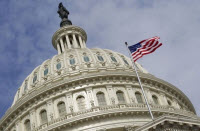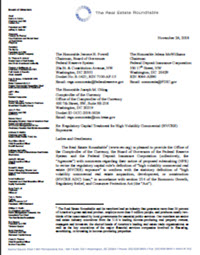President Trump today signed a spending measure to fund the government until Dec. 21, buying time for policymakers to negotiate over the key issue of funding a border wall on the Mexican border. (RollCall, Dec. 7)
 |
The 115th Congress is now scheduled to end on Dec. 21. |
Separately, a House GOP tax bill introduced last week, which includes tax "extenders" and technical corrections of importance to commercial real estate, faces an uncertain future in the remaining weeks of the lame duck session. Congressional tax-writers and leaders do not appear to be any closer to an agreement that would include certain tax provisions in the end-of-year spending bill, such as a technical correction related to the depreciation schedule for nonresidential, interior real estate improvements. (Roundtable Weekly, Nov. 30 and BGov, Dec. 7)
The 115th Congress is scheduled to end on Dec. 21.
A Dec. 4 report by Heritage Foundation Economist Stephen Moore finds that "promoting and facilitating foreign tourism to the United States can be an effective way to increase American jobs and national output while reducing the nation's trade deficit."
 |
According to Tourism to the U.S. Means More Growth, More Jobs, Lower Trade Deficit by Stephen Moore, when international travelers visit the United States, their spending at hotels, retail stores, attraction properties and restaurants totals nearly $250 billion per year. This economic activity supports approximately 1.2 million U.S. jobs and at least $30 billion in worker pay and benefits. |
The economic importance of foreign travel and tourism to the United States' economy and commercial real estate industry was the focus of a panel discussion during The Roundtable's 2018 Annual Meeting. (Roundtable Weekly, June 15, 2018).
The Real Estate Roundtable's support for a federal proposal that would implement modified capital rules for High Volatility Commercial Real Estate (HVCRE) loan exposures is detailed in a Nov. 26 comment letter to three banking agencies. The Agencies — tasked with developing a rule consistent with Section 214 of the Economic Growth, Regulatory Relief, and Consumer Protection Act (S. 2155) to clarify the capital treatment of HVCRE Acquisition, Development, or Construction (ADC) loans — invited comments on their Notice of Proposed Rulemaking. (Roundtable Weekly, May 25)
 |
The Real Estate Roundtable's support for a federal proposal that would implement modified capital rules for High Volatility Commercial Real Estate (HVCRE) loan exposures is detailed in a Nov. 26 comment letter to three banking agencies.. |
The Agencies' HVCRE proposal was one of the issues discussed at this week's meeting of The Roundtable's Real Estate Capital Advisory Committee (RECPAC). Since 2015, The Roundtable's HVCRE Working Group and industry coalition partners have played a key role in advancing specific reforms to the HVCRE Rule. (Roundtable HVCRE Comment Letter, March 2).